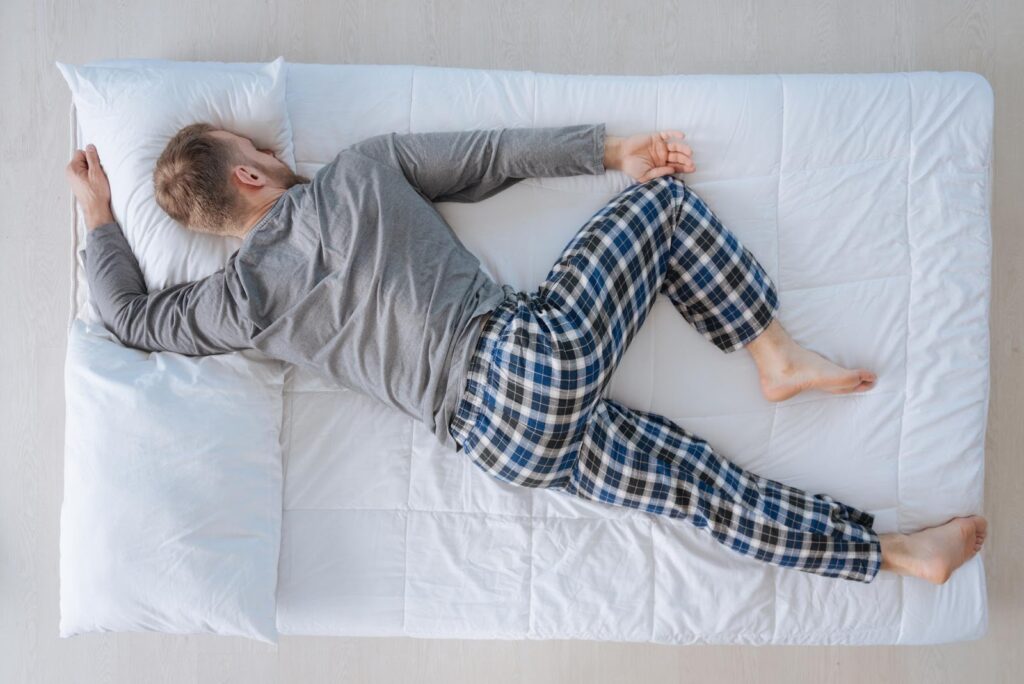What does your sleeping position say about you?
Most people don’t really think about the position that they sleep in. They just lay down, close their eyes, and once they drift off, that’s all she wrote. Others go through great pains to change their sleep position because they snore or wake up with crippling back pain.
While it’s true that some sleep positions are better for your health than others, that’s not exactly what we’ll be discussing today. In this post, we’re going to go through different sleeping positions and tell you what they might say about your personality. We spend 1/3 of our lives in bed, so you can bet that our personalities shine through, even in sleep.
Giving More Thought to Your Sleeping Position
As we said earlier, your sleeping position is likely not something you’ve thought much about and it’s probably not something that you consciously decided. As you get a bit older, however, you might have to correct your position in order to deal with a health condition or to satisfy an annoyed partner.
Why do we settle on certain sleeping positions? Let’s take a look at some of the factors that affect the way we sleep.
Comfort & Extenuating Circumstances
Of course, comfort is the most important factor that decides your sleep position. After all, how can you get a good night’s sleep if you’re feeling uncomfortable?
Unfortunately, how you get your comfort is going to adjust over time. When you share a bed with your partner, your mutual comfort is at stake. If you get your best sleep when you starfish and take up the whole bed, your partner won’t get to sleep in their desired position.
Luckily, humans are fairly adaptable and comfort is only a surface-level factor. The more invisible factors that affect sleep position are gender and age.
Gender
Men and women have different needs when it comes to sleep positions. For instance, women are more likely to sleep in the fetal position than men are. Why exactly this is, we don’t really know.
During pregnancy, in particular, women almost always need to sleep on their side in order to improve the flow of blood and nutrients into the placenta. Back sleeping during pregnancy can create a lot of back pain and breathing issues. If you’re experiencing this, it might be a good idea to find the best mattress for back pain.
Age
For children, it’s more common to switch sleeping positions frequently throughout the night. As you get older, however, you’re more likely to end up sleeping on your side. Some studies have suggested that this is to boost heart function during sleep, but nothing has been proven on the matter.
Whether you gravitate to side sleeping or stomach sleeping, your particular position is something that you develop with age. Not only is it a matter of habit, but even more so, it has to do with your personal health and any aches and pains that a certain position either exacerbates or relieves. For example, if you suffer from sleep apnea, you might elect to sleep on your stomach, which is proven to relieve this condition.
What Does Your Sleeping Position Say About You?
Now that we understand the physical factors that influence our sleep positions, it’s time to look inside the mind. Here are some of the personality traits associated with different sleeping positions. Try and see if this matches up with you or your bed mate.
Back Sleepers
Back sleeping is commonly associated with self-confidence, stubbornness, and high expectations of others. However, the actual personality insights lay in what your arms are doing while you’re sleeping on your back.
If your arms are down at your sides, like a soldier at attention, it tells us that you’re more reserved. You’re probably the strong and silent type that takes getting their 8-hours very seriously.
On the other hand, if your arms are outstretched, you’re more likely a laid back, open-minded person. It shows that you care deeply about others, even if you’re taking up most of the bed with your starfish position.
Side Sleepers
Side-sleeping is the most common of all the sleep positions. People who choose this one are typically very relaxed and open to compromise, even during sleep hours. If you sleep on your right side, it might tell us that you like caffeine or nicotine, while the left side might tell us that you’re a creative person.
Keeping your arms at your sides might tell us that you’re trusting, maybe even to a fault. Arms outstretched might say that you’re more suspicious or even curious about the world.
Stomach Sleepers
By far the least popular sleep position is the stomach sleep. Cruelly, the research that’s been done on this shows that stomach sleepers tend to be defensive, perfectionists, and sensitive to criticism. They may feel overwhelmed easily and lack control over their lives.
Fetal Sleepers
Sleeping in the fetal position connotes feelings of anxiety, deep sensitivity, and a yearning for comfort. You might be organized and dedicated, but you’re shy and tend to overthink a lot of simple things.
Other Sleepers
These are the four main sleeping positions, but there are variations within each and other positions altogether that might say a little something about you. For instance, sleeping with half of your body hanging off the bed shows that you like to live on the edge. How poetic!
If you and your bedmate tend to cuddle during sleep, it can be a sign of intimacy. However, it seems that the most confident and comfortable couples actually tend to stick to their respective sides of the bed.
Should You Make a Sleepy Switch?
So, did these personality traits match up with your preferred sleeping position?
Hopefully, we were able to answer the question, “what does your sleeping position say about you?”, but you may not fall simply into one of these categories. Getting the proper amount of sleep every night is one of the most important things in life, so whatever gets the job done is just fine, as long as there aren’t any health repercussions.
Did you enjoy this post? Come back again for more on health, fitness, and fashion.



